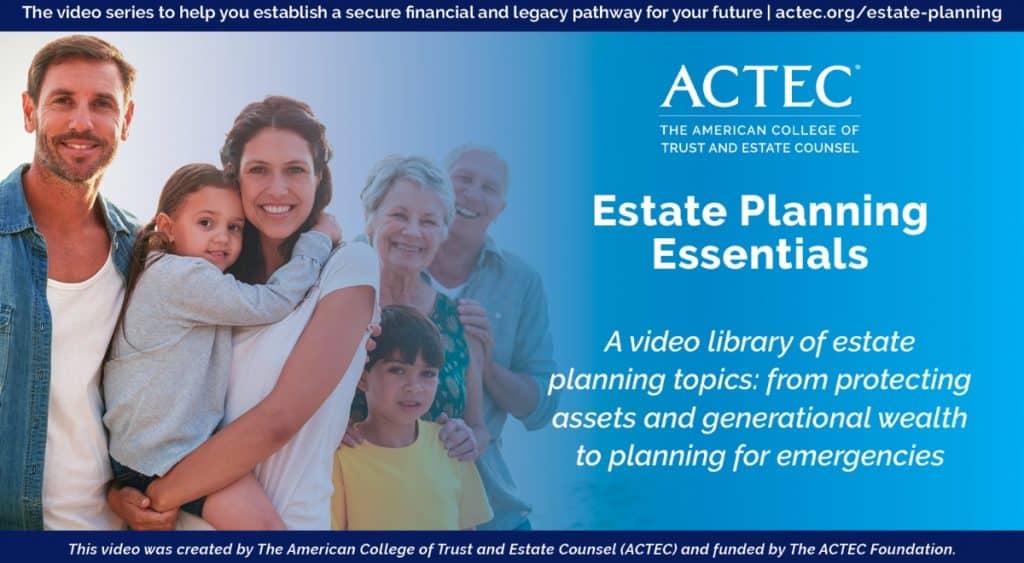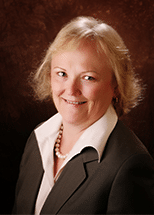The period following the death of a loved one or other person who was important to you, known as “bereavement,” is a stressful and emotional time with many tasks, decisions, and communications that must be made. Having a plan can help reduce stress.
ACTEC Fellows Linda Funke Johnson and Kerri L.S. Mast offer recommendations and a checklist of considerations following a death. Learn who needs to be initially contacted, decisions that need to be made while planning the burial or cremation, and how to keep assets safe during this period.
Resources
- Estate Planning Checklist for End of Life
- A Child’s Right to Information When a Parent Dies
- Inheritance and Estate Settlement: When Will I Get My Money?
- Postmortem Planning
- Key Roles Involved in an Estate Plan
Need a probate attorney? Visit ACTEC’s Find a Fellow and search your state!
Transcript
Hello, my name is Kerri Mast and I am an ACTEC Fellow in North Carolina. Joining me today is Linda Johnson, an ACTEC Fellow also from North Carolina. Today we’re going to be discussing a very important topic.
What are the first things I should do when someone dies? During that period of bereavement, immediately following death, what do I need to be concentrating on?
Linda, thank you so much for being with us today and for sharing your expertise.
Communication Steps Following the Death
First things first. If someone I love dies, I’ll tell our family and friends. Who else do I need to tell?
Linda Johnson: I think you’ve made a great start starting with your family and friends because that’s probably the most difficult. Then we might need to reach out to the funeral home, cremation society, whichever service you’ll use. Then, if our loved one was still working, their employer and the attorney that the loved one’s working with, and check and see if there are pets at the home, make sure that they’re taken care of.
Kerri Mast: Linda, that’s a great point regarding the pets. Thank you for mentioning that. How do I handle the arrangements regarding the disposition of the body?
Disposition of the Body Following a Death
Linda Johnson: I think we first need to step back and see was our decedent an organ donor. And once you’ve determined that, and that’s been taken care of, if they are a donor, then we want to start determining what did our loved one want for a funeral. What were their hopes?
Planning the Burial or Cremation
So we could have a full burial with a service, cremation with also the service. We could have a green funeral. Also we’re hopeful that the decedent shared their thoughts about their funeral with their family. With cremation, we might need to get the family members to sign off. Then you need to contact the funeral home and schedule a time for the family to meet and make the arrangements. And then you’re going to have a long laundry list:
- Do we want to have a funeral home memorial?
- Will it be at a church or a synagogue?
- Are we just going to have a grave site, or are we going to just have nothing if that’s really what the decedent wanted?
- Then you need to think about officiant, flowers, music, a program, charity of choice for donations, and individuals to do the eulogies.
- You’ll want to get thank you cards.
- Are we having food post-service?
- Do we know music and Bible verses?
- Are we going to be buried at a cemetery?
- Do we need a columbarium for cremains?
- Do we need a headstone?
- If our decedent was part of the military, they may qualify for military honors at the funeral, payment of a headstone, or engraving.
- And then we have to decide where the remains will finally be interred. Is it in this state or is it in a different state? Because then you might need to hire a second funeral home.
- And don’t forget the obituary.
Kerri Mast: Wow, Linda, that sounds like a lot of moving parts, and it sounds really expensive. How do all the bills for this get paid?
Cost of a Funeral or Burial
Linda Johnson: Kerri, it’s shockingly expensive. Our average funeral is going to cost a with burial with a grave site will be at least $10,000. Then we have to pay for a grave site. Another thousand. We have to get it open and closed, headstone and engraving. And then we haven’t even added any extra frills like the flying doves or the horse with caisson pulling the casket.
So you need to look for a preneed funeral policy. If there’s an insurance policy that can be assigned to the funeral home, that needs to occur, or perhaps your testator has prepaid. In the worst-case scenario, you might have to ask family and friends to pay for the funeral and they may get reimbursed at a later date from the estate if there are funds. But you have to explain to them that they may not get reimbursed.
Additional Actions to Take After Someone Dies
Then I would look to see what type of bills the decedent has outstanding, and prepare a summary of this. Bills can’t be paid unless we have a joint account or a trust account. So it’s safest to wait until you have a few weeks to get a good snapshot of how much debt is going on. And again, you might need a loan from your family members to keep the lights on in the house.
Also we want to keep the insurance on in the house if the decedent was the only one living there because now you have an empty home.
Steps to Take Regarding Personal Property Following the Death of a Person
Kerri Mast: Now, Linda, I know that my loved one owned certain property. They had an investment account, and they owned a home and some other property. How do I handle those things in the weeks immediately following death?
Linda Johnson: The first thing I would do is get to the house. We want the locks changed because we don’t know who had keys. If you have tangible personal property that’s valuable that is easily transported, I would remove it from the home and store it safely. You want to make sure the utilities are still on. We don’t want to let our pipes freeze. And again, don’t forget about our homeowners insurance.
I think you want to reach out to your investment advisor initially–just notify them of the death. We’d like to you know freeze the account so to speak, and once you do receive a death certificate then you can have an official meeting with them and work through the process.
And with the car, we want the car parked. You have to go find it and get it parked. And I also would recommend destroying the decedent’s credit cards and notifying the credit card company because we don’t want someone using those cards that shouldn’t be.
Obtaining a Death Certificate
Kerri Mast: Yeah, that’s a great point, Linda. You mentioned getting a death certificate. How many of those do I need and who gets them?
Linda Johnson: Okay I’ll start with the easy part first. So the funeral home or the cremation society will order those for you and they also will contact Social Security to report the death, and they’ll stop payments from Social Security.
Now, you need to step back and figure out how many accounts and different types of vendors, investment facilities that the decedent was involved with, and that’ll give us a good head count on how many death certificates to order. I say a minimum you’d want at least 10.
Initial Steps if You Are Named as the Executor of an Estate
Kerri Mast: Linda, if I’m named as the executor of the estate, what do I do? I feel like there are a lot of different tasks that need to be accomplished, and I’m worried I could miss a step.
Linda Johnson: I would strongly suggest you go find the original will/trust, and make an appointment with an experienced probate attorney. As the executor, you’ll fill out your application and then they will lead you through the next steps.
Kerri Mast: That’s great. Linda, we’ve talked about notifying friends and family, going through the funeral arrangements and disposition of the body, and how bills get paid immediately after death. What else do I need to be thinking about?
Linda Johnson: Well, it’s going to be a very emotional time for the family. And the family dynamics may shift with the death of your loved one, especially in our blended family scenarios.
I recommend griefshare.org for the family members and friends that are having a difficulty processing the death. And to our surviving spouse: no big changes for a year. If that’s possible.
Kerri Mast: That is great advice, Linda. All of this is great advice. Thank you for sharing your expertise today.
For our listeners, if you would like to download a PDF of this bereavement checklist, it will be available on ACTEC website (actec.org/bereavement-checklist). Thank you.
Featured Video
Estate Planning Checklist for End of Life
End of life considerations after a terminal diagnosis are deeply personal and often challenging. Learn what estate planning steps can be taken during this time and download the companion checklist.
ACTEC Estate Planning Essentials

ACTEC Fellows provide answers to frequently asked trust and estate planning questions in this video series.




